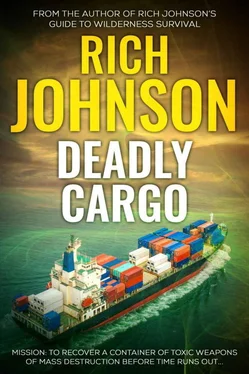He turned to the chart table where, in spite of all the electronic gear onboard, the navigator still maintained a dead reckoning plot on paper charts – just in case the electronics failed. The captain scribed a line with his finger and tapped hard at one spot.
“We’ve got about four hours, I’d say, and she’s going to run over the top of us right about here. What’s the wind speed at the eye wall?”
Moyes swallowed a rising lump in his throat. “Reported to be 145 and rising, sir.”
“Forecast storm track?”
“Miami is forecasting three options, sir.”
“Let me guess. One is to sweep up this way,” – he ran his finger across the chart – “through the Yucatan Channel and into the Gulf of Mexico. Another is to slam into the coast somewhere between Honduras and Belize, blowing the place to bits and wrecking the local tourism economy. And the third is to do something totally unpredictable.”
“Yes, sir.”
“Are they giving percentages?”
“Not yet.”
Sleagle looked at his weather officer, as if waiting for something more.
Finally it came. “Not yet, sir,” Moyes’ eyes fell to the floor in silent apology for neglecting to be properly respectful.
“That will be all for now, Mr Moyes,” Sleagle said. “Keep me updated every thirty minutes. But if there are any significant changes from what you’ve already told me, I want to know it immediately. Do you understand?”
“Aye, sir.”
Moyes turned away and returned to the ship’s weather station where he could monitor all the major forecasting stations, tap into satellite imagery, and receive real-time reports from data buoys and other ships in the region. A murmur stirred in his mind, but he was smart enough to never let it near his lips. He resented Sleagle and his constant demand for what he called ‘proper military respect’. A quiet plan was growing, and he was more certain now than ever that this was his last voyage under the dictatorial command of Sleagle. In Miami, he planned to terminate his contract and find a nice, friendly cruise ship to work for. He’d seen the brochures. The food was undoubtedly better. There were parties every night. Rather than shipping containers, the decks would be lined with gorgeous babes. And maybe, just maybe, he could finally drop the ‘sir’ from his working vocabulary.
As ordered, Peter Moyes delivered weather updates to Captain Eric Sleagle every half hour. At each report, he addressed the man he despised with the hated word ‘sir’. By the time he made his third report, winds were screaming at more than 70 knots, already at the first level of hurricane strength. Moyes knew that worse was yet to come as the center of the storm approached. Wind strength would increase steadily, doubling what they were already feeling, and perhaps even more than doubling by the time the eye wall slammed into them.
Desdemonda was rolling hard now, and every now and then there was a thunderous boom that shook the ship as the hull was hammered by a wave that was out of synch with the vessel’s rhythmic roll and pitch. In calm seas, the ballast of heavy cargo was an advantage that helped keep the ship steady, but in conditions like this, the kinetic energy of half a million tons of swaying weight only amplified the movement. And with the cargo containers stacked as high as they were on Desdemonda, a great deal of weight was above the water line, raising the center of gravity and creating an inherently unstable load.
Like the swinging of a heavy pendulum, once the rolling motion started, the more the ship wanted to continue to roll, first to one side and then the other. Ballast in the cargo holds below decks acted as the far side of the teeter-totter, counterbalancing the weight above decks, but that concept was only good up to a point. Even sailboats with heavily ballasted keels were known to be rolled over in heavy seas, and Desdemonda was a far cry from having a sailboat’s self-righting ability. Everyone onboard understood that, if the winds and seas continued to worsen, it was not inconceivable for the enormous ship to roll all the way over and never come up. There were no guarantees of safety just because she was a big ship.
Captain Sleagle had gambled on being able to outrun the storm. He stared out the expansive windows of the bridge deck and mentally kicked himself for his decision back in Colon. He could have stayed put and waited for the storm to pass. But sometimes a hurricane will progress so slowly that a fast ship can easily outmaneuver or outrun the danger. The report he had received from the weather service before leaving port showed that the storm had stalled for more than eight hours before beginning to move again very slowly, and he was counting on being able to outrun it and stay on schedule to Miami. But in the last dozen hours, it had picked up speed and was roaring like a freight train. He saw now that he was going to lose the race.
Moyes cleared his throat. “Wind strength is at 74, sir. Significant wave height is thirty-nine feet. Both wind and sea state are rising steadily, sir.” He doubled up on the ‘sirs’ as a barely visible form of personal protest, but said the word through a clenched jaw. Maybe it was the stress of the approaching storm, or the fact that he was seasick and had spent the past twenty minutes bent over the toilet. But Peter Moyes was angry. He was sick and angry, and he wanted to be anywhere else but here. The last thing he wanted was to report to Sleagle.
Above the noise of the storm, the captain detected the difference in the way his weather officer talked to him. It wasn’t just his imagination. The first officer and the navigator heard it, too. They looked up from their work, glanced curiously at each other and then stared at the captain and the weather officer.
“You don’t look well, Mr Moyes.”
“I’m not well, sir,” Moyes yelled. “I’m sick to death of this ship and this storm. And mostly, I’m sick to death of you. Sir.” He spat the last word. “You got us into this. We could have stayed in Panama and let the storm pass, but no, you had to be the hero.”
Sleagle had seen this before: a young man who thought life at sea was going to be nothing but a grand adventure, seeing the world on somebody else’s nickel and having a girl in every port; then the realities of it hits him square between the eyes, and he can’t take it
“Well, son,” – the captain put a hand on the young officer’s shoulder, looked earnestly in his eyes and spoke with an almost hushed calm – “we can talk about my judgment later. But you are this ship’s weather officer. Right now, you are one of the most important people on this ship and we are relying on your judgment to help get us through this.”
The calm voice of the captain took Peter Moyes aback. He didn’t know quite what to say, so he stood there with his mouth shut.
“We need you to be on top of your game right now. You must pull yourself together enough to be an asset to the command team. We’re all depending on you. But I suggest that you go to my cabin, lie down, shut your eyes and rest for a while. It will make you feel better. I’ll call for you when I need you.”
“Your cabin, sir?” This time, the word ‘sir’ didn’t stick quite so hard in his throat.
“Yes. My cabin will be the most comfortable place for you right now.” He reached into his pocket, pulled out a key and handed it to the young man. “Go on. We’ll handle things until you are back on your feet.”
“Who will do the weather for you, sir?” The question was carried on a weak voice.
Sleagle smiled and patted the lad on the shoulder. “Don’t you worry about that right now. When I got started in this business, I was a weather officer just like you. I think I can handle things.”
Читать дальше












